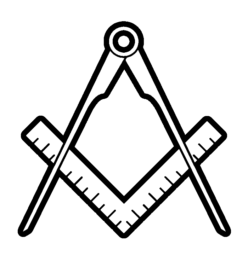This was a Junior Warden’s Law Talk for the November 2019 stated meeting of Fort Worth Lodge № 148, AF&AM.
There are many laws that the Grand Lodge has laid down about teaching & and learning. These laws establish a set of rules that we have to follow to stay out of trouble.
Article 127 states that “no ritual other than that promulgated by this Grand Lodge shall be taught or used in this Jurisdiction.”1 To “promulgate” something is to promote it or make it “widely known.”2
This means that we can’t:
- teach you an alternative trial lecture, or
- use the ritual from another Jurisdiction, or
- make up our own work.
There’s a grand tradition in Masonry of pointing out how different Grand Lodge laws don’t work. The most literal interpretation of this law’s phrasing is a good example of this. At face value, it means that teaching a candidate incorrect work by accident is also against the law! It also begs a few questions:
- How do we define “ritual?”
- The full-form degree lectures are no longer made “widely known” by the Grand Lodge. Are the full-form lectures legal?
- Are the funeral services considered ritual? If so, are the services that are no longer included in the Monitor, and thus no longer promulgated, legal to use?
Article 138 states that if the holder of an esoteric certificate asks a lodge or Mason(s) to “employ or accept his services to teach or exemplify the work” shall lose his certificate. 3
Two things worth noting are:
- there’s no mention of receiving compensation.
- “Employ or accept his services” isn’t defined in the text.
Let’s use another literal interpretation. If I walk up to an Entered Apprentice and tell him, “let me teach you the work,” I am breaking the law.
Article 139 states that you can’t exemplify ritual or be compensated for it unless you hold an esoteric certificate.4 This means that you can’t lead a floor school if you don’t hold a certificate. It may also bar you from instructing students. The language of “receive compensation therefor” also seems to imply that you can be paid for leading a floor school. Article 142 supports this, in that no compensation can occur for a floor school unless the lodge authorizes and pays for it to happen in a lodge room. <sup>5</sup>
Article 140 states that we can ask any member of the Committee on Work or any certificate holder to teach the work. <sup>6</sup>
There several types of Masons who may not receive instruction in the work:
- Someone suspended for non-payment of dues. <sup>7</sup>
- An Entered Apprentice or Fellowcraft whose advancement was protested. <sup>8</sup>
- An Entered Apprentice or Fellowcraft who is required to petition for advancement due to lapse of time. <sup>9</sup>
Article 439.2 states that a Master Mason who goes ninety days without during in his proficiency is automatically suspended. It also states that he can still receive instruction and be examined in an open lodge. <sup>10</sup> Master Masons will want to pay close attention to that point. This article means that Grand Lodge law allows for members of the lodge to or, sit in lodge with a suspended Mason. That would be a violation of our obligation.
It shall also be a Masonic disciplinary violation for a Lodge, a committee or any combination of Masons, or an individual Mason to possess, or use a cipher/code book on a Lodge premises, or to use a cipher/code book or access a cipher/code book in any form, including electronic access, in the presence of a candidate when instructing the candidate in the esoteric work of a Masonic Degree. <sup>11</sup>
Title V, Chapter 2, Article 508.24
That one speaks for itself.
In short, there’s a lot of ways to be unpleasantly surprised, legally speaking, when instructing or learning. It’s important that we pay attention to these kinds of laws. We don’t want anyone to get in trouble just for trying to progress in Masonry, or participating in lodge activities.
Notes
- Grand Lodge of Texas. The Laws of the Grand Lodge of Texas A.F. & A.M. Containing the Corporate Charter, the Constitution and Ancient Charges, the Statutes and Masonic Forms. Revised 2019. Title I, Chapter 17 “Committee on Work”, Article 127 “Ritual”.
- Merriam-Webster, s.v. “promulgate,” accessed November 11, 2019, https://www.merriam-webster.com/dictionary/promulgate
- Grand Lodge of Texas. The Laws of the Grand Lodge of Texas A.F. & A.M. Containing the Corporate Charter, the Constitution and Ancient Charges, the Statutes and Masonic Forms. Revised 2019. Title I, Chapter 17 “Committee on Work”, Article 138 “Certificates: Forfeiture.”
- Ibid. Article 139 “Esoteric Work: Who May Exemplify.”
- Ibid. Article 142 “Esoteric Work: Schools of Instruction.”
- Ibid. Article 140 “Esoteric Work: Employing Instructor.”
- Ibid. Title II, Chapter 18, Article 323 “Effect of Suspension.”
- Ibid. Title IV, Chapter 4, Article 434 “Procedure After Rejection.”
- Ibid. Article 434a “Procedure After Lapse of Time.”
- Ibid. Article 439.2 “Examination in Master’s Degree.”
- Ibid. Title IV, Chapter 2, Article 508.24 “Certain Other Masonic Disciplinary Violations.”
